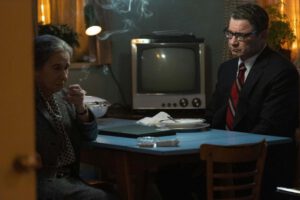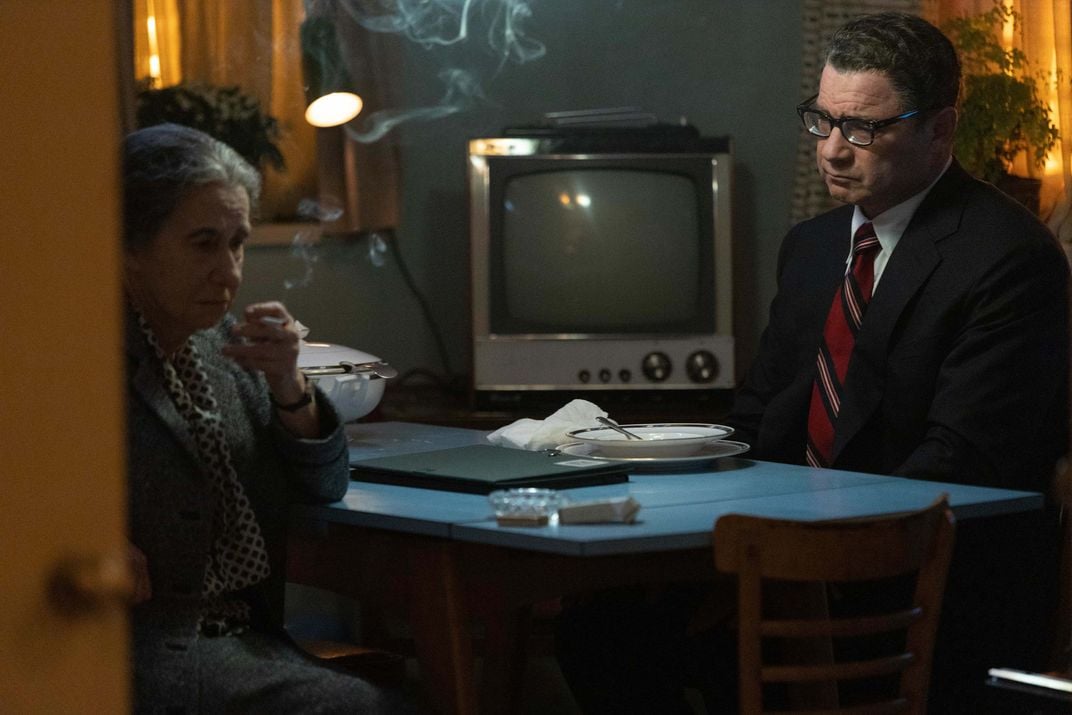Movie Info
Movie Info
- Director
- Guy Nattiv
- Run Time
- 1 hour and 40 minutes
- Rating
- PG-13
VP Content Ratings
- Violence
- 2/10
- Language
- 1/10
- Sex & Nudity
- 1/10
- Star Rating
Relevant Quotes
Thus says the Lord:
See, a people is coming from the land of the north;
a great nation is stirring from the farthest parts of the earth.
They grasp the bow and the javelin;
they are cruel and have no mercy;
their sound is like the roaring sea;
they ride on horses,
equipped like a warrior for battle,
against you, O daughter Zion!
“We have heard news of them;
our hands fall helpless;
anguish has taken hold of us,
pain as of a woman in labor.
Do not go out into the field
or walk on the road,
for the enemy has a sword;
terror is on every side.”

Long before Britain’s Margaret Thatcher, Israel’s Golda Meir was dubbed “The Iron Lady.” And as we see in director Guy Nattiv and scriptwriter Nicholas Martin’s biopic, Golda Meir possessed a heart as warm as her will was strong. However, their film is not a full biopic because it focuses mainly upon Mrs. Meir’s leadership during the Yom Kipper War when she was over 70 years old. Reactions to the film have been mixed, though the majority of critics have praised Helen Mirren’s remarkable performance, enhanced by prosthetics and wig, as the title character.
The film opens with short newsreels and headlines of Israel’s founding as a state in 1948, of the Arab-Israel War (a.k.a. the Six Day War) in 1967, and then jumping to 1973 with the beginning of the Watergate scandal in the U.S. A title card informs us, “Four years after Golda Meir’s election as a caretaker prime minister and still overconfident from their victory in the Six Day War, Israel enters the fall of 1973 unprepared to face the consequences of their hubris.”
Most of the story takes place inside government offices and conference rooms in Tel Aviv, as well as up on the rooftop where Golda often goes to smoke and think. The woman seems to be an obsessive chain smoker, lighting up even in the hospital where she goes for secret treatment of the cancer that will eventually claim her life. Cigarettes are almost a character in the story, with a half-filled ashtray becoming full used to show the passage of time. At another point one of her generals uses two cigarette packets as armies to show on a map his plan to cross the Suez Canal.
The story is framed by Golda’s testifying before the Agranat Commission which, following the war, had been set up to inquire why the country had been so unprepared, with the result that thousands of casualties had resulted. Golda had begun her leadership with the people strongly admiring and supporting her, but now they were blaming her, her popularity plummeting so much that in 1974 she would resign. In a real sense, this film is Guy Nattiv and Nicholas Martin’s attempt to defend and restore her reputation. (It will be interesting to see how this film is received in that country.)
Admitting to her lack of military training, Golda relies on her cabinet which consists largely of army and intelligence officers. Best known to us, thanks to his eyepatch, is the Minister of Defense is Moshe Dayan (Rami Heuberger), who will almost break down after he is sent in a night-time helicopter ride to see the carnage taking place below him on the Golan Heights. Her Chief of Staff is “Dodo” Elazar (Lior Ashkenazi), and Field General Ariel Sharon (Ohad Knoller), who will become Prime Minister years later. The person closest to Golda, both physically as her longtime personal assistant and emotionally as caring friend, is Lou Kaddar (Camille Cotton). If I wanted to select a film about female friendship or sisterhood, this would be among the group, there being so many small moments on display of their affection.
In the days leading up to the war, General Dayan and others advise that a war is unlikely, even though some intelligence reports have revealed that the Syrians to the north and the Egyptians in the south are amassing their troops at the borders. During the Six Day War the Israeli’s had captured the Sinai Peninsula from Egypt, the West Bank from Jordan, and the Golan Heights from Syria, so the Arab leaders have wanted to retake their lost territories. With aid from the Soviet Union, the Arabs had obtained thousands of tanks and munitions. The “hubris” mentioned in the aforementioned title card came from Israel’s quick and easy victory in that earlier war, leading to the military’s underestimating their enemies. Golda chooses a compromise between those who advise no action to the report and those who argue for full mobilization of the army.
But this number of troops—well over 100,000– will soon prove to be inadequate, especially in the north where the Syrians have thousands of tanks attacking an Israeli force that had less than two hundred. When General Dayan returns from his flight over the Golan Heights, almost traumatized by the knowledge that he had been so wrong, we see the iron resolve in Golda. She refuses his offer of resignation, telling him she needs him. She orders him to go home for a rest and to “snap out of it!”
Golda talks by phone with US Secretary of State Henry Kissinger (ably played by Liev Schreiber), asking for US aid. Apparently they have a history together, the two addressing each other by their first names rather than their titles. In seeking more backing, Golda partially blames the US for Israeli casualties by her statement that it was her promise to him and President Nixon that the Israelis would not start a preemptory strike against their enemies. During one of their exchanges she says to Kisinger, “If we have to, we will fight alone,” which will remind you of Winston Churchill in Darkest Hour.
We are given little information on Golda Meir’s earlier life—no mention of the years spent in the USA when the family had fled persecution in her native Ukraine. She does speak of her father hiding from a pogrom in Kiev, now declaring her iron resolve in the face of the present danger from their enemies, “I am not that little girl hiding in the cellar!” Indeed, she is not, as she bolsters Gen. Dayan and her other cabinet members at a time when it looks like their attackers will actually take over their nation. She even states that if they are defeated, she will not leave Tel Aviv. A saving factor, she points out, is that they do not realize that they have won and therefore have not followed through on their success, pausing for a while in their attack.
Although this is a war picture, there are just glimpses of the deadly fighting. We see the bloody battles from the standpoint of Golda and her cabinet—from grainy film shots, blips on radar screens, and the agonized voices of the soldiers broadcast on the radio to the Israeli cabinet room. These voices are often panicky, of men under attack and knowing that they soon will die. We see Golda’s deep humanity, not only in her facial expressions and words, but also in the numerous shots of her jotting down in her pocket notebook the casualty numbers in various battles. She clearly feels the loss of each soldier as she gamely bears the weight of the nation upon her sloping shoulders.
Unlike Jeremiah in the passage quoted above, Golda Meir is an atheist, and so she does not turn to prayer, pleading with the Creator for deliverance from the foreign invader. Though the prophet and the Prime Minister do not share a faith, they do share a courage that will not give up, and they also both face also a crisis in which their nation’s very existence is at stake. Golda’s courage is strong enough to stand against the “terror…on every side.” The iron-willed leader is fighting not only the public battles of the war that threaten her young nation, but also a personal battle in the hospital against the lymphonia that eventually even she cannot conquer. The film does omit her blindness when it came to the plight of the displaced Palestinians, whose existence as a people she denied, but hopefully we can still see her as a woman who deserves to be honored and celebrated as one of the most remarkable women of the 20th century..
This review will be in the Sept. issue of VP along with a set of questions for reflection and/or discussion. If you have found reviews on this site helpful, please consider purchasing a subscription or individual issue in The Store.

